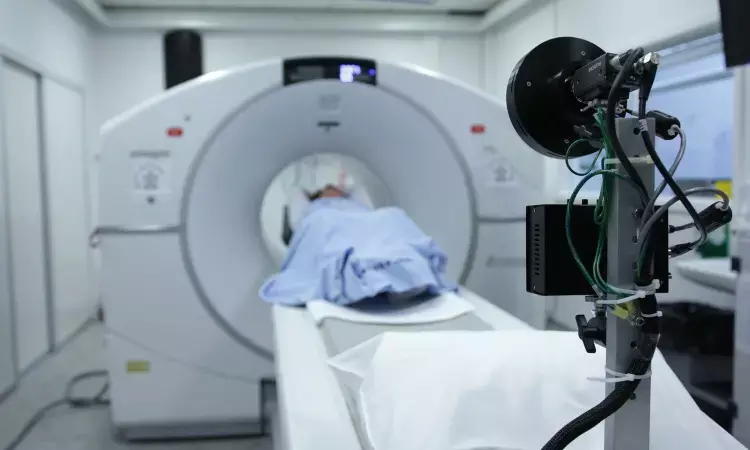- Home
- Medical news & Guidelines
- Anesthesiology
- Cardiology and CTVS
- Critical Care
- Dentistry
- Dermatology
- Diabetes and Endocrinology
- ENT
- Gastroenterology
- Medicine
- Nephrology
- Neurology
- Obstretics-Gynaecology
- Oncology
- Ophthalmology
- Orthopaedics
- Pediatrics-Neonatology
- Psychiatry
- Pulmonology
- Radiology
- Surgery
- Urology
- Laboratory Medicine
- Diet
- Nursing
- Paramedical
- Physiotherapy
- Health news
- Fact Check
- Bone Health Fact Check
- Brain Health Fact Check
- Cancer Related Fact Check
- Child Care Fact Check
- Dental and oral health fact check
- Diabetes and metabolic health fact check
- Diet and Nutrition Fact Check
- Eye and ENT Care Fact Check
- Fitness fact check
- Gut health fact check
- Heart health fact check
- Kidney health fact check
- Medical education fact check
- Men's health fact check
- Respiratory fact check
- Skin and hair care fact check
- Vaccine and Immunization fact check
- Women's health fact check
- AYUSH
- State News
- Andaman and Nicobar Islands
- Andhra Pradesh
- Arunachal Pradesh
- Assam
- Bihar
- Chandigarh
- Chattisgarh
- Dadra and Nagar Haveli
- Daman and Diu
- Delhi
- Goa
- Gujarat
- Haryana
- Himachal Pradesh
- Jammu & Kashmir
- Jharkhand
- Karnataka
- Kerala
- Ladakh
- Lakshadweep
- Madhya Pradesh
- Maharashtra
- Manipur
- Meghalaya
- Mizoram
- Nagaland
- Odisha
- Puducherry
- Punjab
- Rajasthan
- Sikkim
- Tamil Nadu
- Telangana
- Tripura
- Uttar Pradesh
- Uttrakhand
- West Bengal
- Medical Education
- Industry
Exposure to CT examinations raises brain cancer risk in children: Study

Germany: Radiation exposure from CT (computed tomography) imaging raises the risk of brain cancer in children by up to fivefold, depending on the exposure level, according to findings from a large, multicentre study.
"Individual dose evaluation stresses careful justification of pediatric CTs and doses use should be as low as reasonably possible," Prof Michael Hauptmann from Brandenburg Medical School in Neuruppin, Germany, and colleagues wrote in their study published in the Lancet Oncology.
Computed tomography is a valuable diagnostic tool but transmits significant radiation of particular concern for children. Patients, however, are exposed to much higher radiation doses than those linked with chest X-rays and most other radiological diagnostic procedures. Despite some initiatives, such as ImageGently and guidelines, many CT exams may be performed unneeded, and dose reduction measures should be used more.
The European EPI-CT study aims to estimate cancer risks from CT examinations of young adults and children. In the study, Dr Hauptmann and colleagues assessed the risk of brain cancer.
For this purpose, the researchers pooled data from nine European countries. Participants with at least one CT examination before the age of 22 documented between 1977 and 2014 no previous benign brain tumour or cancer and were alive and cancer-free at least five years after the first CT were deemed eligible. Identification of the participants was made through the Radiology Information System in 276 hospitals. According to the WHO definition, patients were linked with regional or national registries of vital status and cancer and eligible people with brain cancers. A separate analysis of gliomas was done. Reconstruction of organ doses was done using a large sample of CT images and historical machine settings. ERRs (excess relative risks) of brain cancer per 100 mGy of cumulative brain dose was calculated.
The outcome was the first reported brain cancer diagnosis following an exclusion period of 5 years after the first electronically recorded CT examination. A total of 948 174 individuals were identified, of whom 69% were eligible for the study.
The study led to the following findings:
- After a median follow-up of 5·6 years, 165 brain cancers occurred, including 73% gliomas.
- The mean cumulative brain dose, lagged by five years, was 47·4 mGy among all individuals and 76·0 mGy in brain cancer patients.
- The researchers observed a significant linear dose-response relationship for all brain cancers (ERR per 100 mGy 1·27) and gliomas (ERR per 100 mGy 1·11) separately.
- Findings were robust when the start of follow-up was delayed beyond five years and when patients with possibly previously unreported cancers were excluded.
"The study highlights the need for careful consideration in cases of CT imaging in a pediatric population," the authors wrote.
"The results stress the need to stick to the basic radiological protection principles in medicine, namely optimization and justification."
Reference:
The study, "Brain cancer after radiation exposure from CT examinations of children and young adults: results from the EPI-CT cohort study," was published in Lancet Oncology. DOI: https://doi.org/10.1016/S1470-2045(22)00655-6
Dr Kamal Kant Kohli-MBBS, DTCD- a chest specialist with more than 30 years of practice and a flair for writing clinical articles, Dr Kamal Kant Kohli joined Medical Dialogues as a Chief Editor of Medical News. Besides writing articles, as an editor, he proofreads and verifies all the medical content published on Medical Dialogues including those coming from journals, studies,medical conferences,guidelines etc. Email: drkohli@medicaldialogues.in. Contact no. 011-43720751


